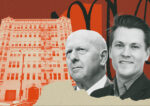Trending
Wealthy families look to smaller cities for bigger returns on real estate investments
In London, for example, interest in properties outside the city's core has surged among private investors, according to brokerage Knight Frank

Wealthy families are seeking real estate investments in smaller cities with bigger potential returns than trophy assets in the biggest cities.
For example, a Bahrain family who made a fortune in the auto industry invests in U.K. real estate through an entity called Riverton Capital Holding, and its portfolio increasingly includes properties outside central London.
Among other properties in Riverton’s portfolio is Beacon House, a four-story, red-brick office building a one-hour drive from the core of London’s commercial property market.
Riverton paid 5.8 million pounds ($7.5 million) in late 2017 for Beacon House, located in the Wimbledon district, where rents for prime office properties have risen faster in the last five years than in the City of London.
Lofty prices for properties in the heart of big cities have led investors to seek real estate opportunities elsewhere. While many of these opportunities are too small for pension funds and other institutional investors, they are attracting rich families and private investment vehicles like Riverton.
In 2018 and 2017, real estate outside central London comprised the largest share of private investors’ acquisitions of London properties in this decade, according to brokerage firm Knight Frank.
Outside the largest U.S. cities, demand for real estate among foreign investors has jumped in such second-tier cities as Dallas and Philadelphia, according to CBRE Group Inc.
On average, direct investments in real estate comprise 17 percent of the portfolios of family offices, according to Campden Wealth and UBS Group AG.
That exceeds the average portfolio allocation of 10 percent to real estate by institutional investors, according to research results released last year by Cornell University and Hodes Weill & Associates LP. [Bloomberg] – Mike Seemuth




